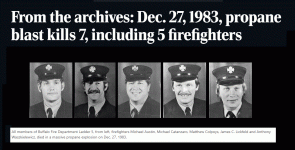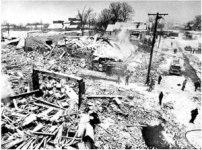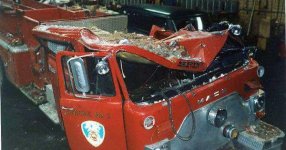30 years later, survivors recount horror of propane blast
By Gene Warner
Dec 22, 2013
It was the Buffalo Fire Department’s darkest night: Dec. 27, 1983.
Thirty years later, longtime Buffalo-area residents remember that five city firefighters, all members of Ladder 5, lost their lives in a horrific propane tank explosion that leveled a four-story building along North Division Street east of downtown.
Many others remember that two civilians, a mother and son who lived near the warehouse, were fatally injured that day.
But outside South Buffalo and the closely knit Buffalo Fire Department community, few people know the fate of the firefighter most seriously injured that day, Gary McAndrews, from Engine 32.
McAndrews was 15 to 20 feet from the Chimera Radiator warehouse when the propane tank exploded.
The force knocked him out of his firefighter boots and hurled him over a fire chief’s vehicle. He suffered a shattered left leg and shrapnel wounds all over his body, was unconscious for four days and suffered a stroke 33 days after the blast.
But McAndrews, whose own family didn’t think he would survive his massive injuries, is alive and well now.
He is 66, walks with a noticeable limp and speaks mostly in phrases and short sentences.
Still, he is thankful to be alive. Nursed back to health by his wife, Carol, two children and a host of doctors, nurses and friends, he has learned to play golf, can drive, reads newspapers and books and still follows his beloved Detroit Tigers.
And above all, he was there to support his wife and family when their two children had their own medical crises. Their son, Brian, was diagnosed with leukemia at age 11, less than two years after the explosion. And their daughter, Shannon, underwent a 16-hour surgery for a benign brain tumor while still in college, 15 years after the blast.
Both are fine now. Brian is a golf pro. Shannon Krieger is a teacher, and they have given their parents five grandchildren.
Gary McAndrews was asked whether he has thought about why he – and not the other five firefighters – survived.
“Millions of times,” he said. “My friends passed away. Explosion. And I’m alive. I don’t know. I’m thinking Brian’s leukemia, Shannon’s brain surgery.”
Carol McAndrews, relying on her faith, has no doubts that is why her husband survived.
“Absolutely,” she said, during a two-hour interview in the couple’s Hamburg home. “He was saved because I never could have taken care of my son and daughter without him. No way.”
Gary McAndrews went through years of speech therapy. Several times, doctors almost decided to amputate his left leg.
He has persevered, just as the Buffalo Fire Department has, its bonds a little tighter after adjusting to the loss of five brothers.
The blast
At 8:23 p.m. that night – 20:23 in fire-department lingo – a full assignment was dispatched to North Division and Grosvenor streets, just east of Jefferson Avenue, responding to a report of a “large propane tank leaking in a building.”
Engine 32 arrived and reported “nothing showing,” as other firefighters raced to the scene, according to Firehouse magazine and other reports. Thirty-seven seconds after the battalion chief announced his arrival, the tank exploded.
Some have described that blast scene simply as a war zone. One division chief commanded the scene with a 5-inch stake sticking in his neck. Some firefighters screamed for help, trapped in their truck. Others raced into burned-out houses to rescue survivors. One fire truck had been blown across the street into a row of houses. Bodies were buried under the rubble.
And some tough-as-nails firefighters were reduced to tears.
As former Buffalo Fire Commissioner Michael Lombardo, then a rookie firefighter, later described the explosion for Firehouse: “It completely leveled the entire four-story building; it demolished many buildings on four different blocks. It seriously damaged buildings that were over a half a mile away. The ensuing fireball started buildings burning on a number of streets. A large Gothic church on the next block had a huge section ripped out of it as if a great hand carved out the middle.”
Then came the erroneous reports. A crawl at the bottom of the Sabres telecast claimed that 23 firefighters were dead. Reports filtered out that one of the five firefighters who had died was OK. And at least one woman frantically looking for her firefighter husband was told that one of the dead men in the hospital closely resembled him.
Gary McAndrews remembers little of that night.
“Fifteen or 20 feet away,” he recalled. “My mask on. Walking there. The building. The last thing, red ball and ...”
Then, in reliving that awful moment, he put his hands over his face.
“Coming at me.”
Carol McAndrews was sitting home that night, watching the Sabres game, when she got a call from a Columbus Hospital nurse that her husband had been in an accident and that she had to have someone drive her there. She had no other information.
“We got to the top of the Skyway, and we could see one whole area of the city on fire,” she recalled.
Then, after reaching Columbus Hospital, she got to see her husband.
“It looked like someone had taken an air pump and blown him up, from the impact,” she remembered. “And it looked like he had stitches all over him. That must have been the pieces of metal that went into his skin everywhere – face, arms and chest.”
“And wood,” her husband added.
The aftermath
Gary McAndrews wouldn’t regain consciousness for four days, until Dec. 31, the day his five colleagues were buried.
But, as it turned out, he was conscious for at least a few minutes that first night. Taken to Columbus Hospital and wanting to notify his wife, he somehow managed to give a nurse his home phone number, which she wrote on her hand.
He later couldn’t remember having done that, even after that nurse read about him and came to visit him in Buffalo General Hospital.
That brief recall of his phone number was an act of God, one of many that have touched the McAndrewses, they believe.
“I realized that God watches over you, and He’s there to make sure that your loved ones know what’s happening,” Carol McAndrews said.
New Year’s Eve day, when thousands of firefighters from near and far lined four blocks outside St. Joseph’s Cathedral to pay their respects, McAndrews regained consciousness.
Without access to a TV or any other information in the Intensive Care Unit, McAndrews didn’t know about his five buddies. So Carol McAndrews asked Fire Department Chaplain Albert W. Clody to tell him.
“He just told him that five of his brothers had perished in the explosion,” she said. “Gary thought he was the only one who was hurt. He just cried, sad, disbelief.”
Thirty-three days after the blast, McAndrews suffered a disabling stroke on his right side.
“Honestly, after the stroke, I thought maybe we should throw in the towel,” Carol McAndrews said. “It was one thing after another. When was he going to get better? But your faith brings you back.”
You don’t hear any regrets from the McAndrews couple about how they have handled their adversity. And they feel pretty lucky with everything that has happened to them.
But Carol McAndrews did reveal one wish that won’t be granted.
“I can’t remember what Gary was like before the explosion,” she said. “I’d just like once to hear his voice again, the way it was before the stroke.”
There have been plenty of ups and downs, both in McAndrews’ physical condition and his children’s medical issues.
One bright spot occurred 10 months after the blast, when Fire Commissioner Fred D. Langdon and Mayor James D. Griffin surprised McAndrews by promoting him to lieutenant during a Fire Prevention luncheon.
“Mentally, I’m thinking, in six months I’m working,” McAndrews remembered. “Well, no.”
The cause
Like a devastating plane crash, the explosion was an accident. But human fault also was a factor.
The explosion occurred when an employee was moving an unlicensed 500-pound propane tank with a forklift truck and dropped it, breaking off a valve, according to multiple news reports. The gas then leaked throughout the four-story building before a wood-burning stove ignited the explosion.
Two years after the incident, the remaining defendant in the criminal case, a co-owner of the warehouse, was acquitted of felony charges.
That left McAndrews upset, at a time when he didn’t speak as well as he does now.
“Me, therapy and speech, Monday, Tuesday and Wednesday,” he told The Buffalo News in October 1985. “And this man is OK. Jail, no. Fine, no.”
A full 10 years after the explosion, attorneys involved in the 53 lawsuits generated by the blast agreed on $5.6 million in insurance payments to the many aggrieved parties, including the families of the seven people who were killed. That included $1.2 million to McAndrews, by far the most seriously injured survivor.
•••
The survivors
The five lost firefighters left five young widows and a total of 16 children, some too young to have known their fathers.
In the last 30 years, the children have grown up and most of their mothers have remarried.
“As a group, we all had great husbands and fathers,” said Jean Catanzaro Hubbard, the wife of Michael “Mickey” Catanzaro. “I think the good memories we had with them are what made it easier to go on.”
As she has told her four sons, “It’s not what you have in life. It’s the memories you have. And the memories are free.”
Mickey Catanzaro, 30 years after his death, has eight grandchildren and a ninth on the way. None of them ever knew him, but they still call him Papa Mickey.
The Catanzaros have a continuing link to the Buffalo Fire Department. Twenty months ago, in April 2012, the family’s youngest son, Nicholas, was sworn in as a firefighter recruit.
For years, friends and loved ones have marveled that Nick, one of four boys, looks and acts the most like his father – even though he was too young to remember him, only 9 months old when his father lost his life.
“I’m overwhelmed,” Nick said about following in his father’s footsteps. “I know my dad’s up there watching down on me and taking care of me. All I want to do is make him proud.”
In the small world of the Buffalo Fire Department, Mickey Catanzaro and Gary McAndrews were cousins.
The five firefighters’ survivors know they weren’t the only ones who lost so much that awful night. They also know how much of a struggle Gary McAndrews and his family have waged.
“He paid the highest price from that night,” Hubbard said. “He has to live with it every day. It’s like being in Vietnam or Iraq, seeing your friends killed, and then you have to come back home and build your own life.”
The civilians

Nobody lost more on that nightmare of a night than Ernest Arnold Sr.
His youngest son, Alfred J., 34, a Buffalo State College graduate, was killed when a chunk of debris slammed into his chest as he tried to warn his mother of possible trouble.
Ernest Arnold’s wife, Jessie, 69, died four weeks later of related injuries.
Arnold also lost the home they shared at 612 N. Division St.
“I think about it every day,” Arnold told The Buffalo News five years later. “At first, you think about all the misery they went through that night. But now you can reminisce about how things were good when they were alive.”
Mrs. Arnold planned her youngest son’s funeral from her hospital bed, four weeks before she died.
“It probably would have been better for her not to suffer,” Arnold said in 1988. “But I’m glad she lived as long as she did. We had hope until the last minute.”
Arnold was scheduled to be off work the night of the explosion, but a last-minute schedule change took him to his job – and away from a probable death.
“You have mixed feelings about that,” he said. “Sometimes you say, maybe we should have gone together, as a unit.”
Ernest Arnold Sr. died in December 2000, at age 91.
•••
The dilemma
Anniversaries of tragic events pose a tough dilemma for those most intimately affected.
Whether it’s 9/11, Pearl Harbor, Newtown or Buffalo’s propane explosion, some victims’ families want the publicity to go away. Sometimes, it is too personal, even invasive. And yet many families don’t want anyone to forget those whole lives were taken away, whose families were robbed by terrorism, military attacks, mad gunmen or even accidents.
It’s a tricky tightrope.
Five years after the December 1983 explosion, some families and fire officials said they wished the annual stories would stop. Buffalo Catholic Fire Chaplain Joseph W. Bayne remembers hearing that sentiment following a memorial tribute to the five firefighters a few years ago.
“I just remember a couple of families said it was time to move on,” he said. “We’ve remembered, and we’re never going to forget. But some people accept a loss, deal with it and go on with their lives without making it another red-letter day. Some of that hullabaloo is painful.”
Gary and Carol McAndrews agreed to tell their story for the 30th anniversary, partly to set the record straight about what happened to him that day – and since. They also want to pay tribute to everyone killed or wounded and to remind the public of the painful lesson from that blast.
“They should remember that every police officer and firefighter who goes off to work might not come home,” Carol McAndrews said. “They put their life on the line every day.”
The brotherhood
Outsiders have a tough time understanding the brotherhood of the Buffalo Fire Department. The five firefighters killed that day were Michael Austin, Michael Catanzaro, James C. Lickfeld, Anthony Waszkielewicz and Matthew Colpoys.
But to McAndrews, who shared a Ladder 5/Engine 32 firehouse with them at Seneca and Swan streets, they were Mike, Mickey, Red, Tony and Matty.
“It’s family,” Gary McAndrews explained. “A firefighters’ house. Fooling around and ribbing each other.”
Former Fire Commissioner Lombardo put it another way.
“Part of the reason I think there is a brotherhood and sisterhood in firefighting, law enforcement and the military is that you’re placing your life in someone else’s hands, and you’re putting your life in danger on a routine basis,” he said. “So you draw a stronger bond.”
For all they have been through, the McAndrewses are thankful. They have a lovely home in Hamburg, stay in a modest Florida condo about five months a year and spend a lot of time with their two healthy children, Brian and Shannon, and five grandchildren.
Gary McAndrews didn’t hesitate when asked if he has any survivors’ guilt.
“I’m thankful I’m alive,” he replied. “No guilt.
It was the Buffalo Fire Department’s darkest night: Five city firefighters and two civilians were killed in an explosion on North Division Street on Dec. 27,

buffalonews.com





